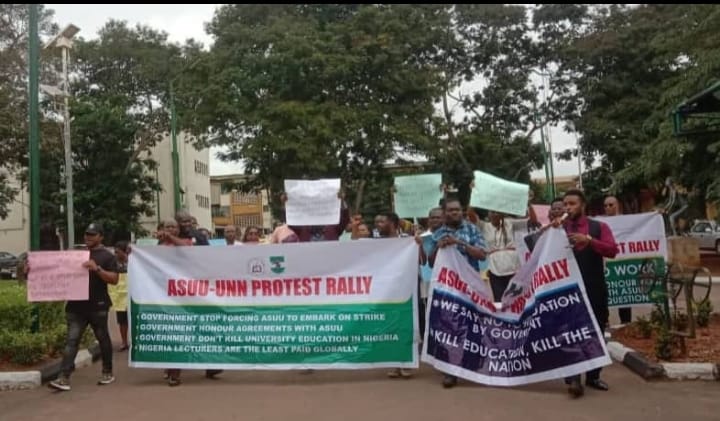By Sakariyah, Ridwanullah
Once again, Nigeria’s academic landscape is disrupted. On Sunday, October 12, 2025, the Academic Staff Union of Universities (ASUU) declared a two-week warning strike, citing government inaction on long-pending issues. According to a report by Vanguard Newspaper, ASUU’s National President, Professor Chris Piwuna, announced that the union would “withdraw their services with effect from midnight on Monday, 13 October 2025.”
Piwuna gave a clear warning that if the government failed to act after the warning period, the union would escalate to a total, comprehensive strike. He criticized the government’s response to its prior ultimatum, declaring, “It is regrettable to note that nothing significant has happened since our last briefing…the hurriedly packaged documents were a total departure…and incapable of dousing industrial tension.”
The union’s demands touch multiple fronts, concluding the renegotiated 2009 FGN-ASUU Agreement, payment of withheld salaries, sustainable funding and revitalisation of public universities, promotion arrears, and the removal of victimisation of lecturers in certain institutions.
READ ALSO: Senate vows to mediate in prolonged ASUU-FG dispute
In response, the Federal Government asserted that it had already addressed ASUU’s demands. In a televised interview on Channels Television, Education Minister Dr Tunji Alausa stated, “We have addressed every single request by ASUU; there is no need for this strike, and we are pleading with them to go back to school.”
Alausa further detailed that N50 billion in earned academic allowance arrears has been paid, that the arrears had been mainstreamed into salaries to prevent future accumulations, and that the government had released part of the NEEDS Assessment Fund. He also claimed that “the promotion arrears…will be paid with the 2026 budget” and insisted that stipends for postgraduate supervision, which were part of ASUU’s demands, were being handled at institutional levels.
Despite these assertions, ASUU rejected the government’s position that its demands were fully met. The union described parts of FG’s response as tokenistic or delayed. A report by ICIR quoted ASUU insisting that “without concrete action. it will be compelled to escalate its strike beyond the initial two weeks.”
Complexity arose from the government’s posture on enforcement. As the strike commenced, the Ministry of Education issued a circular that directed Vice-Chancellors to enforce a “no-work, no-pay” policy against lecturers participating in the industrial action. The Guardian reported that this measure was communicated to federal universities across Nigeria, requiring headcounts and docking pay for any lecturers who default.
In several universities including Federal University Dutse (Jigawa), University of Nigeria, Nsukka, University of Jos, Ahmadu Bello University, and University of Lagos, some students were observed leaving campus, while some preparing to depart as the strike took effect. According to The Guardian, academic activity was halted nationwide.
In the political arena, the National Assembly has waded into the dispute. In a resolution passed by the House of Representatives, lawmakers urged immediate intervention to forestall the breakdown of the university system. Punch reported that the National Assembly views the standoff as damaging to national development and a waste of student years.
While ASUU still pursues industrial action, other academic staff groups have taken counter-positions. The Congress of University Academics (CONUA) declared that it would not join the strike and would continue classes in universities where it operates. Vanguard quoted CONUA’s leader stating that there was “no reason” to embark on strike under the current conditions.
The standoff appears unlikely to resolve quickly. This is because ASUU’s leadership still insists that the government must back its claims with verifiable implementation, not rhetoric. Piwuna criticized prior government negotiation efforts, while describing them as “delay tactics” and “provocative” in presentation, and said the union would not be placated by partial, politically packaged “gifts.”
READ ALSO: ASUU declares two-week warning strike as government talks stall
Meanwhile, the public folds its arms and watches anxiously. Students frustratingly face uncertainty, semesters inevitably risk extension, and pressure heavily mounts on policymakers to act responsibly. If government’s promises are still not fulfilled, the warning strike may morph into a protracted crisis, and of course, the credibility of public higher education might take yet another blow.



